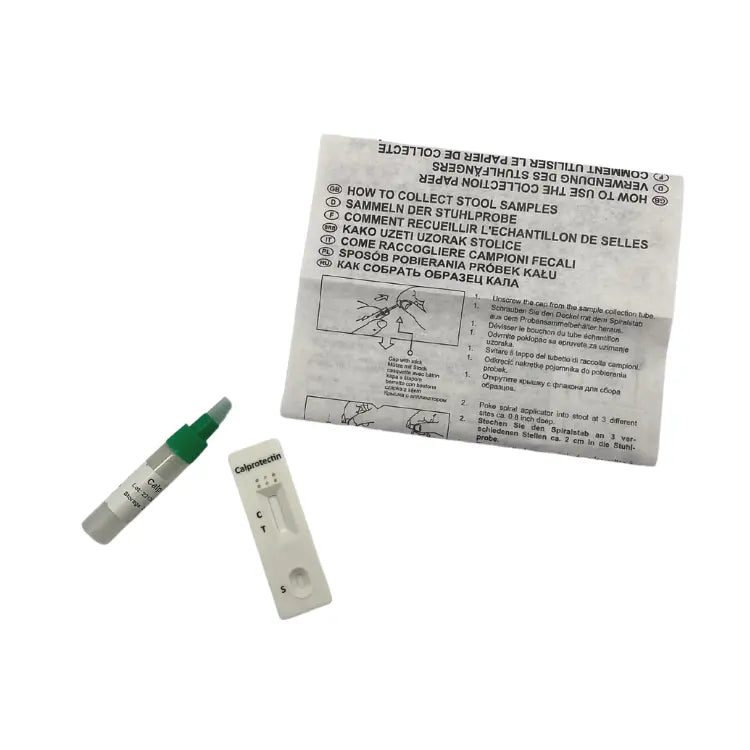Inflammatory Bowel Disease (IBD) Test
Inflammatory Bowel Disease (IBD) Test
Couldn't load pickup availability
Shipping & Returns
Shipping & Returns
- Same day dispatch on orders placed by midday
- 14-day cancellation period if you change your mind
- Easy-to-use test kit, no need to send sample.
What's included?
What's included?
1 x Test Cassette
1 x Specimen Collection Tube with Extraction Buffer included.
1 x Instructions
1 x Paper Stool Catcher
Note: You will require a method to time the process.
Share


Collapsible content
Product Description
The at-home Calprotectin Test gives a rapid indication of inflammatory gastrointestinal disorders aiding the possible diagnosis of inflammatory bowel disease (IBD) and eliminating irritable bowel syndrome as a cause of similar symptoms. Early detection of IBD is an effective strategy to avoid disease progression. There are two types of IBD, which are Crohn’s Disease and Ulcerative Colitis.
Currently, there is no definitive test for irritable bowel syndrome, however inflammatory bowel disease may require more invasive investigations such as a colonoscopy. People often confuse IBS and IBD, both are gut illnesses and have very common symptoms, but they require very different treatments.
Faecal Calprotectin is used to distinguish IBD from IBS or other functional disorders and is one of the most sensitive (approximately 90%) biomarkers for IBD. It is a useful, non-invasive screening method that can sometimes mean avoiding unnecessary endoscopies and consultation time with doctors. Other serological tests cannot measure bowel inflammation and can be influenced by a variety of other non-intestinal conditions.
The amount of Calprotectin in faeces relatively correlates with intestinal inflammation, and as a general rule, the higher the Calprotectin level - the more severe the inflammation can be due to bacterial and parasitic infections.
▶IBD SYMPTOMS:
Monitoring your Calprotectin levels on a regular basis can check gastrointestinal conditions, detect early IBD, or monitor IBD treatment. Reasons for using this test include:
- Persistent loose stools
- Abdominal pain
- Rectal bleeding/bloody stools
- Weight loss
- Fatigue
- Cramps or stomach swelling
- Bowel urgency
- Family history of IBD
▶ HOW IT WORKS:
The Calprotectin Rapid Test detects levels of Faecal Calprotectin qualitatively and the test cassette membrane is precoated in an anti-Calprotectin antibody covering the test line region (T) which the Calprotectin in the specimen reacts with. The mixture migrates upwards by capillary action, reacting with the anti-Calprotectin antibody and generating a coloured line. Two coloured lines on the cassette in the C (Control) and T (test) regions indicate a positive result and a valid test result.
The intensity of the colour of the T region will vary depending on the concentration of Calprotectin in the specimen. This means that any shade of colour in the test region should be considered a positive result. Calprotectin levels above 50ug/g in your stool could indicate inflammation somewhere in your gastrointestinal system. You may or may not have blood in your stool sample.
High concentrations of Faecal Calprotectin can indicate IBD, however a diagnosis should not be based on the results of one single lateral flow test and further medical investigation should be sought. Faecal Calprotectin levels can be influenced by colonic cleansing, age, diet, exercise, and certain amounts of blood or mucus in that particular stool sample.
▶ REFERENCES:
Items Tested
Concentrated levels of Calprotectin will show as a positive test result on the test region (T) of the cassette and the more intense the colour, the higher the concentration of Calprotectin in the sample which can indicate IBD.
The results can then be used to seek further medical treatment and to implement healthier lifestyle choices depending on the body’s condition.
Science
Calprotectin is a calcium and zinc binding protein which belongs to the S-100 protein family that modulate cellular responses throughout the human body. Faecal Calprotectin is a result of neutrophil migration into gastrointestinal tissue caused by inflammation. Neutrophils make up 40-70% of all white blood cells that form an essential part of the immune system.
Gastrointestinal inflammation is a complex response to injury caused by an array of different stimuli, such as damaged cells, irritants, or disease-producing pathogens. The digestive tract contains a symbiotic microbiome that protects the gut by removing harmful substances or stimuli. Changes in this microbiota or its healthy absence can compromise your immunity and create inflammatory complications, including possible allergic, infectious, or parasitic diseases.
This inflammation recruits and selects cells that remove inflammatory stimuli and ones that promote tissue restoration. Calprotectin helps immune regulatory functions and its found in neutrophils that are one of the first immune cells to respond to damage or the site of infection. They ingest microorganisms and release enzymes that kill them, as well as boosting other immune cells to respond.
Research found that Faecal Calprotectin concentrations had a very high correlation with intestinal inflammation and therefore is considered a useful biomarker for gastrointestinal disorders such as IBD. Calprotectin levels over 50 ug/g are generally viewed as abnormal suggesting inflammation, and clinicians use this test regularly and interpret the results in relation to the patient’s symptoms. Some research has shown that even patients in remission with no symptoms who have persistently high levels of Faecal Calprotectin are more likely to relapse six months later compared to those with low levels.
According to the John Hopkins Research Institute, IBD can increase the risk of colon cancer by up to four times. The longer you have an inflamed bowel, the higher the chance you have of cancerous changes occurring in the intestinal cells.
There is no single test to diagnose IBD as the symptoms can be very similar to other medical conditions, however screening Calprotectin levels is considered a highly sensitive biomarker and a useful tool to form a diagnosis including monitoring the condition to prevent further serious damage to your health.


